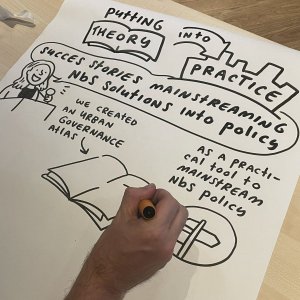
The five-year CLEVER Cities project concluded with a final conference in Hamburg in September 2023. The project aimed to promote sustainable and socially inclusive cities globally, emphasising the importance of green urban spaces, community involvement, knowledge sharing, and Nature-based Solutions (NbS) to address urban challenges. The project increased awareness, demonstrated the benefits of greener cities, informed policy-making, and encouraged the use of NbS in urban planning worldwide.
The CLEVER Cities project featured front-runner cities like Hamburg and fellow cities like Malmö, which are working hard to integrate NbS into urban planning. In Hamburg's Neugraben-Fischbek, the CLEVER Action Lab focused on sustainability and environmental initiatives, including creating a "green corridor" for biodiversity, installing cost-effective green facades along noise barriers and housing estates, and collaborating with a local school to establish school gardens and mobile aquaponics systems, promoting hands-on scientific education and sustainability awareness.
At the conference, the CLEVER Cities Panel introduced audience members to the work conducted In Malmö, Sweden. Here, the project targeted the challenges in the Lindängen neighbourhood, characterised by cultural diversity and socioeconomic disparities. It aimed to co-create health-related solutions with local residents and organisations. Helen Nilsson, a member of the Malmö environmental department, outlined how these efforts align with Malmö's broader initiatives to address inequality, urban development, and climate change, including sustainability-focused areas. During the panel, Malmö extended thanks to the City of London, from which they drew extensive inspiration. The General London Authority's Stella Yeung connected with Helen to discuss the two cities’ similar social economic conditions, referencing the incredible community action work conducted in Thamesmead, London. Later in the day, London's community co-design collective shared their unique perspectives on co-creation and urban greening in a unique multi-media presentation.
Not only the project CLEVER Cities was the focus of the Nature in the City conference. Projects proGIreg, EdiCitNet, and URBiNAT all took the stage during a dedicated sibling project panel, where they reflected on how the outputs of their ending projects will serve communities and future projects. NetworkNature+ also made an appearance! Task Force 6: Co-creation and Governance presented their work on an online co-creation decision making tool, and NetworkNature+ partner The Nature of Cities led a storytelling workshop for NbS advocates, modelled after their well reviewed session at the NetworkNature 2023 Annual Event.
Audience members and sessions also included newer NbS projects, such as NbS EduWORLD, whose Ana Mitic-Radulovic (Urban Planner) moderated the conference’s final reflection panel. In her opening speech, Ana highlighted how the real strength of the event was in the relationships it built between starting and ending projects. The next generation of Horizon NbS projects does not need to reinvent the wheel, rather there is a wide range of resources to build upon and improve.
The final conference was more than just knowledge sharing; it celebrated years of dedication to NbS, co-creation, climate change adaptation, and urban restoration. Visionaries, experts, and innovators who have been at the forefront of transforming urban landscapes through nature integration came together to celebrate successes and acknowledge difficulties. These insights underscored NbS's potential to create resilient, sustainable, and livable cities, setting the stage for a brighter urban future rooted in the power of nature.
You can learn more about the learnings from CLEVER Cities by visiting the CLEVER Cities Guidance, or viewing recordings of the conference.
